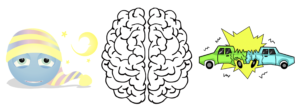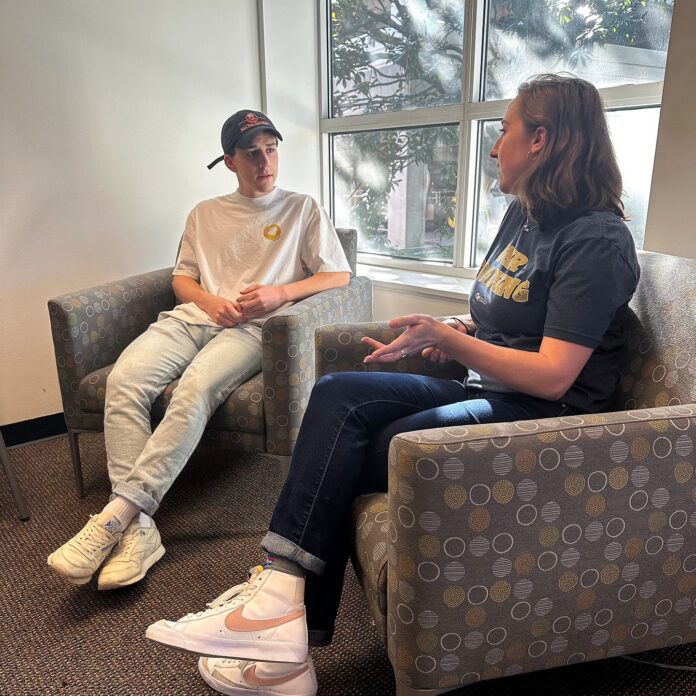Life as a student can be frustratingly busy at times. In the most difficult periods, you have to complete multiple assignments simultaneously, all the while attempting to maintain a moderately healthy social life. You want to ace your tests, maintain your friendships, and visit your family regularly; maintaining balance among these goals is understandably difficult. When life becomes hectic, you may decide to vary from your typical routine, and one of the health behaviors that is often neglected is sleep.
Sleep deprivation is a common problem in the US. At least a third of adults don’t obtain more than 7 hours of sleep each night, and this is detrimental to physical, psychological, and cognitive health (CDC, 2016; Watson et al., 2015). Total sleep deprivation, or failing to obtain any sleep in a given night (i.e., “all-nighters”), is common in student populations; students have reported pulling all-nighters more than twice per month (Hershner & Chervin, 2015). This may be especially common during exam times. For example, students sometimes pull all-nighters in preparation for tests. However, these behaviors have consequences at the behavioral and neural level.
Sleep deprivation tends to increase activation in a control center of the brain, the prefrontal cortex, and this is thought to reflect increased effort to maintain cognitive control (Wilckens, Erickson, and Wheeler, 2012). For example, focusing attention and avoiding distractions may require more effort than when well-rested. Thus, studying all night could lead to undesirable consequences. Not only may students not retain crammed information over long time periods (e.g., weeks, years), but they may also experience dangerous psychomotor impairments (Durmer & Dinges, 2005).
Researchers have found that driving while sleep deprived is statistically equivalent to driving with a blood alcohol content level of being legally intoxicated.
Psychomotor impairments related to sleep deprivation directly affect driving ability. Researchers have found that driving while sleep deprived is similar to driving while under the influence. In fact, it is statistically equivalent to driving with a blood alcohol content level of being legally intoxicated. Those who drive while sleep deprived and those who drive while drunk have trouble maintaining their place on the road. They tend to accidentally cross into other lanes and look away from the road more often. Not surprisingly, the injury rate of motor crashes related to drowsy driving and drunk driving is similar.
As students, we are often warned about the dangers of drunk driving and distracting driving (e.g., texting, talking on the phone), but there is little attention given to the dangers of driving while sleep deprived. The evidence is clear in regards to the importance of obtaining enough sleep for general health and cognitive function. However, if you must miss sleep, please refrain from driving. Instead, call a friend or call another ride. Just as you wouldn’t drive while under the influence, don’t drive while sleep deprived.
References
Centers for Disease Control and Prevention. (2016). 1 in 3 adults don’t get enough sleep. Atlanta, GA: US Department of Health and Human Services. Retrieved from https://www.cdc.gov/media/releases/2016/p0215-enough-sleep.html
Durmer, J. S., & Dinges, D. F. (2005). Neurocognitive Consequences of Sleep Deprivation. Seminars in Neurology, 25, 1996. https://doi.org/10.1055/s-2005-867080
Hershner, S. D. & Chervin, R. D. (2015). Causes and consequences of sleepiness among college students. Nature and Science of Sleep, 2014(6), 73–84.
Watson, N. F., Badr, M. S., Belenky, G., Bliwise, D. L., Buxton, O. M., & Buysse, D. (2015). Joint consensus statement of the American Academy of sleep medicine and sleep research society on the recommended amount of sleep for a healthy adult: methodology and discussion. Sleep, 38(6), 591–592.
Wilckens, K. A., Woo, S. G., Kirk, A. R., Erickson, K. I., & Wheeler, M. E. (2014). Role of sleep continuity and total sleep time in executive function across the adult lifespan. Psychology and Aging, 29(3), 658–665. https://doi.org/10.1037/a0037234


